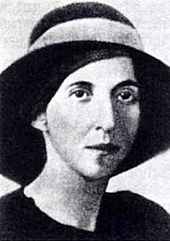Urani Rumbo
Urani Rumbo ( 1895 - 1936 ) was an Albanian feminist , teacher and playwright . She founded various associations to promote Albanian women's rights, the most important of which was Lidhja e Gruas ( German Women's Union ), one of the first outstanding feminist organizations in Albania.
Life
Urani Rumbo was born in December 1895 in Stegopul , a village near Gjirokastra in southern Albania on the slopes of Mount Lunxhëria . Her father, Spiro Rumbo, was a teacher in the nearby villages and her mother, Athana, was a housewife . She had three brothers, Kornil, Thanas and Dhimitër Rumbo, and a sister Emily, who was also an elementary school teacher . She received a basic education and completed six grades at the school in Filiates , where her father worked as a teacher. At the same time she got to know the work of well-known Albanian folklorists and writers. She was able to write Albanian and Greek fluently, and she started teaching Albanian literature when she was 15. From 1910 Rumbo attended a secondary school in Ioannina , but her education was interrupted by the Balkan Wars . During the war she taught herself Italian and French.
From 1916 to 1917 she worked as a teacher for Albanian literature in Dhoksat , a village near her home village, which today belongs to the municipality of Gjirokastra , where she promoted the use of the Albanian language. From 1917 to 1918 she taught in Mingul and Nokova , while in 1919 she taught in the De Rada school of Gjirokastra. In 1919 she started an initiative against the illiteracy of women and a tradition that restricted women to typical household areas. In 1920 she opened the Koto Hoxhi School, named after Koto Hoxhi, one of Albania's revivalists. The Koto Hoxhi School was a five-year elementary school for girls of all religions and from all parts of Gjirokastër. A few years later she became the principal of the school.
During the period of the democratic movement in Albania from 1921 to 1924, Rumbo published articles on problems - particularly the issue of education - that Albanian women faced in the local newspapers Democracy and Drita . At the same time, she developed training courses for women in tailoring, embroidery, agriculture, music and gardening. She also wrote and directed plays and organized school plays to encourage girls to get involved in public life.
On November 23, 1920, together with Hashibe Harshova, Naxhije Hoxha and Xhemile Balili, she founded Lidhja e Gruas in Gjirokastra , one of the most important feminist organizations in Albania to promote women's emancipation. They published a statement in the Drita newspaper to protest against social conditions and discrimination against women. In 1923, Urani Rumbo and other women began a campaign for the right of girls to attend the Lyceum of Gjirokastra like boys.
On July 25, 1924, Rumbo founded the feminist organization Përmirësimi (Improvement) . Përmirësimi organized training courses for women of different social status. On July 4, 1930, she was charged by the authorities for encouraging students from the Koto Hoxhi School to appear in plays. She responded with an article in the newspaper Demokratia denouncing the allegations as absurd.
legacy
Two biographies have been written about Urani Rumbo. The first was published in 1977 and is entitled Urani Rumbo: Teacher of the People ( Albanian Urani Rumbo: Mësuese e Popullit ), while the second was published in 2008 with the title Urani Rumbo: The Famous Worker for the Albanian School ( Albanian Urani Rumbo punëtore e shquar e shkollës shqiptare ) has appeared.
On March 1, 1961, Urani Rumbo was posthumously awarded the Mësuese e Popullit medal ( German teacher of the people ). Today a school in Gjirokastra was named after Urani Rumbo.
Individual evidence
- ↑ Fraciska de Haan, Krasimira Daskalova, Anna Loutfi: Biographical dictionary of women's movements and feminisms in Central, Eastern, and South Eastern Europe: 19th and 20th centuries . In: G - Reference, Information and Interdisciplinary Subjects Series . Central European University Press, 2006, ISBN 963-7326-39-1 , pp. 475–77 ( limited preview in Google Book search).
- ↑ Valentina Mosko: Urani Rumbo: Popullit mësuese e . 8 Nëntori, 1977 ( limited preview in Google Book search).
| personal data | |
|---|---|
| SURNAME | Rumbo, Urani |
| BRIEF DESCRIPTION | Albanian feminist, teacher and playwright |
| DATE OF BIRTH | December 1895 |
| PLACE OF BIRTH | Stegopul |
| DATE OF DEATH | 1936 |
